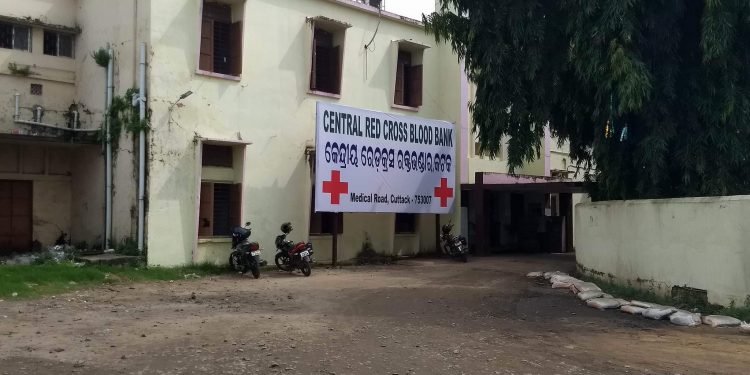Bhubaneswar: Is the Indian Red Cross Society (IRCS) playing with the lives of patients in Odisha? An RTI response to this pertinent query recently revealed several shocking facts about the manner the Central Red Cross Blood Bank (CRCB) at Mangalabag in Cuttack is functioning.
Interestingly, it is the only blood bank in the state, which is affiliated to the Indian Red Cross Society.
The society has been running the blood bank without licence for the past 12 years. There is also a Thalassemia Day Care unit on the premises which has no formal registration at all.
Notably, the state government has taken over all blood banks run by the IRCS in Odisha except the CRCB at Cuttack. According to data available on the website of the Department of Health and Family Welfare, Odisha, the CRCB set up in 1959 is the first blood bank of the state.
It meets two-thirds of the blood requirements of the SCB Medical College and Hospital, Acharya Harihar Regional Centre for Cancer Research and Treatment, Capital City Hospital, Postgraduate Institute of Paediatric, ESI Hospital and nearly 70 hospitals in Cuttack.
The CRCB, in its response to an RTI query submitted by Pratap Chandra Mohanty, asserted that renewal of its licence (No.18) under the Drugs and Cosmetics Act in favour of the CRCB was done way back in 2007. The society which sent its reply September 25, 2019 said application for licence was pending with the Drug Controller, New Delhi, Deputy Drugs Controller, Kolkata and the Drugs Controller in Bhubaneswar.
The Thalassemia Day Care unit, which was inaugurated by Sushila Rajendran, wife of the then Governor MM Rajendran in 2004, has been catering to needs of Thalassemia patients. Strangely, its registration is hanging fire for 15 years. Blood transfusion involves huge risks. Notably, patients suffering from anemia due to blood disorders like thalassemia require transfusion frequently.
The blood bank run by IRCS is considered the lifeline of blood storage and transfusion in the country but the lackadaisical approach of the officials manning the institution brings disrepute to the functionaries who should be held responsible for loss of lives.
Governor of Odisha acts as the IRCS president, while Minister for Health and Family Welfare Naba Das is the chairman of its Working Committee which is the apex decision-making body of IRCS, Odisha unit. The CRCB’s managing committee has Director, Health Services, Drugs Controller and Cuttack Collector who is also the chairperson of district IRCS responsible for the functioning of the blood bank.
However, the panels have turned a blind eye to basic issues like licencing of blood bank and registration of the thalassemia unit.
Who should be accountable in case of emergencies or critical situations arising out of blood transfusion to patients? None, perhaps.
Gyan Ranjan Mohapatra, OP






































